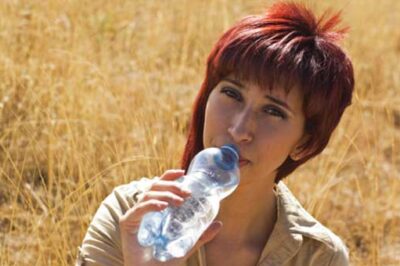You must drink an adequate amount of water to be healthy and lose weight, so this month I am going to share with you information about water’s importance. Every weight-loss program out there that I’ve seen advocates drinking more water than most of us drink on a regular basis.
Why? Because our brain interprets thirst as hunger, and we start grazing for something to satisfy our body’s need. Many times we are not hungry but thirsty.
The Mayo Clinic website on the subject of how much water to drink says we need to replace the fluids our body loses each day. The average output of urine is about 6.3 cups per day for an adult. In addition, other bodily processes, such as breathing and sweating, account for additional fluid loss. Fluid loss must be replaced on a daily basis. Eight 8-ounce glasses of water a day will cover your body’s need for fluid unless you are perspiring heavily due to exercise or hot weather. Then you need more!
There is a debate about whether other fluids, such as soft drinks, fruit juices and iced teas, should be counted as water intake. While they are liquid, anything with caffeine in it acts as a diuretic and further strips water from your system. Fruit juices and tea with sugar—natural or added sugar—are processed by the body as food.
The best solution is to drink plain water and drink enough so that you rarely feel thirsty. Do this one small step of drinking more water each day, and stay with it. It will make a difference.
Calculate H2O
To get a good estimate of how much water to drink, take your body weight in pounds and divide that number in half. For example, if you weigh 160 pounds, you should drink at least 80 ounces of water per day. When you exercise, you should drink another eight-ounce glass of water for every 20 minutes you are active. When you are traveling on an airplane, because the pressurized air is so dry, it is good to drink eight ounces of water for every hour that you are on board the plane. If you live in an arid climate, you should add another two glasses per day. As you can see, your daily need for water can add up.
Memory and Metabolism
Did you know that if you have a mere 2 percent drop in the body’s water supply, it can trigger fuzzy short-term memory, trouble with basic math and difficulty focusing on smaller print, such as that on a computer screen? Also, mild dehydration is one of the most common causes of fatigue. For the most part, the majority of the population is going around somewhat dehydrated, and this is in a country where all we have to do is turn on a tap for clean water. It doesn’t make sense, does it?
Drinking a pint of water will increase metabolism for about a half-hour, causing the body to burn about 25 calories. Researchers believe the increase in metabolism comes from warming the water in the stomach. That means if you drink a pint of water before a meal, you will rev up your metabolism as well as make your stomach feel full. It will help you eat less and burn more when you do eat your meal.
Avoid Dehydration
Avoiding dehydration is crucial if you are trying to lose weight. This is true for several reasons, but one of the most pertinent factors has to do with water’s effect on the body’s vital organs. Studies have shown that a low consumption of water allows more fat to be deposited in the body instead of being metabolized into energy. Water helps our kidneys to flush out toxins. If the kidneys do not have enough water to flush out toxins, then the liver is forced to assist with water filtration. The resulting interference is to the liver’s primary function, which is to burn fat. So drink a sufficient amount of water!
The body is 61.8 percent water. The brain is 70 percent water. We have to have water to survive.
Perhaps you are among those who say they don’t like to drink water. That’s because you have never tried it. Once you start drinking enough water, your body will crave it and will respond positively to being well-hydrated.
More to Consider
- Water assists in the absorption, digestion and metabolism of food because our bodies’ proteins and enzymes work more efficiently in diluted solutions.
- Drinking lots of water results in more muscle mass because our muscles are composed primarily of water.
- Water gives you the energy and hydration needed for exercise.
- When adequate amounts of water are not consumed, our bodies hold on to excess water for survival, causing bloating.
Steve Reynolds is the senior pastor of Capital Baptist Church in Annandale, Va. He is the author of the books Bod4God and Get Off the Couch. He is also the creator of the Losing to Live Weight-Loss Competition. Steve has lost more than 120 pounds and has led his church to lose over seven tons of weight.







Leave a Comment
You must be logged in to post a comment.